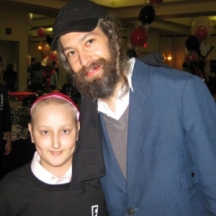By Steven Philp
 It goes without saying that these are trying times. Yet it is in the face of crisis that humankind produces its best music, art, and literature; while grappling with adversity, men and women exercise their creative abilities to express anger, sadness, and—above all—hope that is both genuine and deeply felt. Perhaps it is the celebration of this latter sentiment that prompted MTV to add a new category to its annual Video Music Awards: “Best Video With A Message.” According to Reuters this award was created to “honor artists and music videos that featured a positive message or raised awareness of key social issues facing today’s youth.” Despite chart-topping performances by Pink, Katy Perry, Eminem, Rise Against, and Taylor Swift—whose songs addressed issues ranging from social isolation to domestic violence—it was Lady Gaga’s pro-diversity opus “Born This Way” that clinched the honor. And regardless of what one thinks about the quality of her music, that at the height of her career she would craft a song celebrating the spectrum of human expression—including an explicit nod to the embattled gay, lesbian, bisexual and transgender community—deserves recognition.
It goes without saying that these are trying times. Yet it is in the face of crisis that humankind produces its best music, art, and literature; while grappling with adversity, men and women exercise their creative abilities to express anger, sadness, and—above all—hope that is both genuine and deeply felt. Perhaps it is the celebration of this latter sentiment that prompted MTV to add a new category to its annual Video Music Awards: “Best Video With A Message.” According to Reuters this award was created to “honor artists and music videos that featured a positive message or raised awareness of key social issues facing today’s youth.” Despite chart-topping performances by Pink, Katy Perry, Eminem, Rise Against, and Taylor Swift—whose songs addressed issues ranging from social isolation to domestic violence—it was Lady Gaga’s pro-diversity opus “Born This Way” that clinched the honor. And regardless of what one thinks about the quality of her music, that at the height of her career she would craft a song celebrating the spectrum of human expression—including an explicit nod to the embattled gay, lesbian, bisexual and transgender community—deserves recognition.
Unfortunately the spirit of tolerance embodied by the new award category was belied by MTV’s nomination of up-and-comer Tyler the Creator, who was recognized as this year’s “Best New Artist.” As a press release from the Gay and Lesbian Alliance Against Defamation makes note, his lauded sophomore album Goblin is a celebration of homophobia and misogyny—including 213 occurrences of the word “faggot” and its variations. Instead of sending a message of hope, his lyrics promote violence and normalize discrimination against some of the most marginalized people in our society. In the end, the VMAs is testimony to the state of American music: while there are enough songs to cobble together a new award category that features “positive messages,” our “Best New Artist”—which is selected by popular vote—is actively contributing to the adversity felt by minority communities.
So where can we look for songs of hope, when the pop charts so often lend themselves to the dissemination of bigotry? Just this month, Jewish hip-hop sensation Matisyahu uploaded a new single that serves as a reminder that the most profound inspiration can manifest in the most unexpected places. Rabbi Yonah posted a story on the Jewish-interest blog Jewlicious, detailing the history behind the song. It started with an unlikely friendship, between Matisyahu and a young boy named Elijah. Although the boy was battling cancer, his indefatigable spirit inspired the hip-hop artist prompting several years of after-concert visits and phone exchanges. When Matisyahu was on tour this year, Elijah came to his concert in Florida and asked if they could record a song together. The next morning the boy was admitted to intensive care. With his acoustic accompanist and recording equipment in tow, Matisyahu showed up at the hospital that evening. The result was “Elijah’s Song.” According to Matisyahu, most of the words and many of the lyrical decisions were made by the young boy.
 Unfortunately Elijah passed away that night. Inspired by the boy’s courage, Matisyahu has made the song available online. The song can also be downloaded for a minimum donation of $1, with proceeds going to the Elijah Memorial Fund. Rabbi Yonah makes note that one would expect a song composed by a dying child would be “sad and full of regret,” but the lyrics point to the opposite: that in the face of adversity, hope can be found. Just as artists like Tyler the Creator showcase the damaging power of words, Elijah reminds us that in every creative act is the potential for redemption. In his own words:
Unfortunately Elijah passed away that night. Inspired by the boy’s courage, Matisyahu has made the song available online. The song can also be downloaded for a minimum donation of $1, with proceeds going to the Elijah Memorial Fund. Rabbi Yonah makes note that one would expect a song composed by a dying child would be “sad and full of regret,” but the lyrics point to the opposite: that in the face of adversity, hope can be found. Just as artists like Tyler the Creator showcase the damaging power of words, Elijah reminds us that in every creative act is the potential for redemption. In his own words:
Never know what tomorrow brings,
Don’t have the answers to tell you.
Take it one step at a time,
See where G-d will lead you.

One thought on “Singing a New Song”